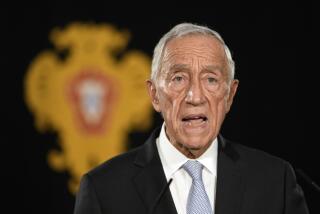Italy Leader Resigns Over Split Within Coalition
ROME — Italian Prime Minister Ciriaco De Mita resigned Friday after a bitter split with his Socialist coalition partners over austerity measures and other issues that proved impossible to resolve.
The 61-year-old Christian Democrat tendered his resignation to President Francesco Cossiga, forcing the collapse of Italy’s 48th government since World War II. It came after a brief emergency Cabinet meeting that considered the implications of a fiercely critical speech by Socialist Party leader Bettino Craxi that wound up a weeklong Socialist Party Congress in Milan.
In the speech earlier Friday, Craxi said De Mita had, in effect, declared his government majority to be nonexistent earlier in the week when he said he no longer knew who his political allies were.
A brief statement issued from Cossiga’s Quirinal Palace office after De Mita’s 20-minute meeting with the head of state followed crisis protocol in saying Cossiga “reserved a decision” on whether to accept the resignation and asked De Mita to maintain his government in a caretaker capacity until the crisis is solved.
Cossiga’s office announced the president will start consultations with political leaders, including party delegations, Monday to seek a candidate capable of forming a new government.
In Washington, State Department spokesman Richard Boucher said De Mita’s resignation should not change President Bush’s plans to visit Rome on May 26-28. It is normal in Italy for caretaker governments to receive visiting guests, and whatever transpires during Bush’s talks with Italian officials would be respected by the next government.
De Mita said he hopes that there will be a quick solution to the crisis because “the policy of restoring health to the financial situation and economic revival which I have had the honor to preside over . . . does not permit a waiting period or postponements . . . .”
Craxi has been attacking the government in repeated speeches for several months, opposing key parts of its austerity program, its failure to push through constitutional reforms demanded by the Socialists and for a general state of “confusion.”
More to Read
Sign up for Essential California
The most important California stories and recommendations in your inbox every morning.
You may occasionally receive promotional content from the Los Angeles Times.










